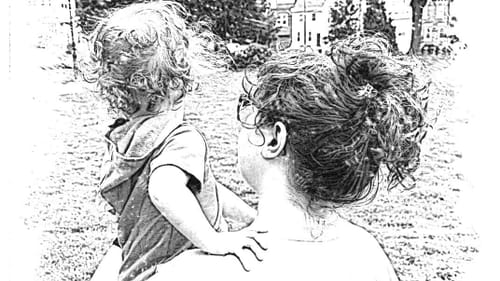Stay in the Loop
BSR publishes on a weekly schedule, with an email newsletter every Wednesday and Thursday morning. There’s no paywall, and subscribing is always free.
Parenting toward what I know our country can be.
In today's America, parenting itself can be an act of patriotism.

My parents have a portrait in caricature of my two sisters and me. The artist drew us at the Flying J Ranch just outside of Ruidoso, New Mexico, over the Fourth of July weekend, circa 1993. Two of us are wearing baseball caps, muted in the sketch but proudly gaudy in real life; a gift from a visiting distant cousin, they were covered in red, blue, and silver sequins appliqued to the canvas in patterns of stars and stripes. We loved them.
Growing up, Independence Day for my family meant flashy hats donned in a faux old-west town, or Old Navy American flag shirts at a friend’s barbecue, or red, white, and blue hair bows at a family picnic. We were so proud to be Americans, and for that day, or that weekend, we let our outsides match our insides.
Fourth of July, then and now
That’s not how I feel about the Fourth of July now. And now that I’m a parent, it’s certainly not how I plan to mark the day with my son.
E was born between Trump administrations, in March of 2024. The first thing I said to him as he was placed into my arms was: “Oh, kiddo, I can’t wait to show you the world.”
But now I find myself questioning whether the world I want to show him should even include the country into which he was born.
Daycare terror
When my husband and I decided it was finally time to put E into daycare, we visited several programs until we found what we believed to be the one. What decided it for me was hearing, in one of the classrooms included on our tour, a teacher addressing her diverse group of students in Spanish.
I grew up more-or-less bilingual on the Mexican border, in a city with a significant Hispanic majority population. The women who took care of my sisters and me when my mother went back to work spoke Spanish to us almost exclusively. The halls of our schools and the kitchens in our friends’ homes echoed with the Spanish language. And in that way, E’s daycare felt like home.
E had been enrolled in his daycare for less than three weeks when the director of the center stopped me on my way in for pickup. “I just wanted to let you know,” she said, “that we had a lockdown today.” It was nine days after Donald Trump was sworn in for his second term in the White House, and already, he had decided to make good on his threats against immigrant populations in the US. There were reports that day that ICE was in the area—a pocket of South Philadelphia with a large Hispanic population—and that agents had entered another childcare center. “They didn’t come here,” the director added, “but we wanted to do our part in protecting our students, their families, and our employees if they tried.”

After I loaded E into the car, I sat behind the wheel and cried. Not out of fear for my own child, or for myself, but because of the sheer cruelty of targeting a building filled with children, using them as leverage to punish their parents for doing nothing more, in many cases, than living in the US without having been born here.
Tainted celebrations
In the days that followed, I found myself wondering what business I had bringing a child into this world. I knew when I got pregnant that there was every chance we’d have a second Trump term, but the biological imperative was too strong, and at 39, I couldn’t wait another four or five years to see what the future held. So I had a baby, the country had an election, and there I was, thinking that if the election had come first, the baby might not be here. And I felt guilty, too, knowing that my blonde, blue-eyed boy would likely be able to float above the worst of it. He would do just fine in this world, even if those around him were less fortunate.
As I am writing this, the National Guard and the Marines have been sent to Los Angeles in a disproportionate response to protests against ICE raids. The president, evidently sore over the millions of people nationwide who marched against him on his birthday while Army tanks creaked slowly past nearly empty stands at his parade in Washington, has vowed to send more agents and more troops into Democratically held cities across the country—likely including ours. The Fourth of July is almost here, and any celebration of our country feels tainted by the knowledge of what our country has become, sometimes over the last 249 years and especially over the last few months.
Parents resisting oppression
I will not be bringing E to any Fourth of July festivities. I won’t be dressing him in red, white, and blue while we’re out and about over the long weekend. But here is what I will do: I will keep exposing him to the diversity that has long made our country, if not great, then at least special. I will rear him to understand our history, scars and all. I will teach him to recognize his privilege and how to use it to help others who were not born into bodies and backgrounds like his. I will raise him to be compassionate, empathetic, thoughtful, and kind, to stand up for others, to fight for what’s right, to challenge narratives that push cruelty on other people who don’t look or act or speak like him.
I am parenting my child as an act of resistance to the systems of oppression that are only escalating at this point in his young life. And in that way, too, I am parenting my child toward what I know our country can be, even if it might be up to his generation to make it so.
That’s a hell of a lot more patriotic than putting him in a stars-and-stripes sequined hat.
Sign up for our newsletter
All of the week's new articles, all in one place. Sign up for the free weekly BSR newsletters, and don't miss a conversation.
 Jillian Ashley Blair Ivey
Jillian Ashley Blair Ivey